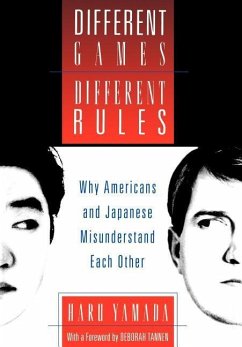Japan and the United States are in closer contact politically and economically than ever before, yet in many ways our nations are as far from mutual understanding as ever. Misconceptions and miscommunications between East and West continue to plague this important relationship, frustrating the best efforts of both cultures to work together. Stereotypes abound: Americans see Japanese as evasive and inscrutable, while Japanese see Americans as pushy and selfish. What causes these persistent misunderstandings, and what can be done to avoid them? Fluent in both languages and at home in both cultures, Haru Yamada brings an insider's perspective and a linguist's training to this difficult question, illuminating the many reasons why Americans and Japanese misunderstand one another. Social organization, she explains, shapes the way we talk. Because American and Japanese cultures value different kinds of social relationships, they play different language games with different sets of rules. The language of both cultures is designed to display and reinforce these values so that words, phrases, and expressions in one language can have completely different connotations in another, leading to all manner of misunderstanding. Yamada provides numerous examples. In a lucid and insightful discussion, Yamada outlines the basic differences between Japanese and American English and analyzes a number of real-life business and social interactions in which these differences led to miscommunication. By understanding how and why each culture speaks in the way that it does, Yamada argues, we can learn to avoid frustrating and damaging failures of communication.
Hinweis: Dieser Artikel kann nur an eine deutsche Lieferadresse ausgeliefert werden.
Hinweis: Dieser Artikel kann nur an eine deutsche Lieferadresse ausgeliefert werden.







